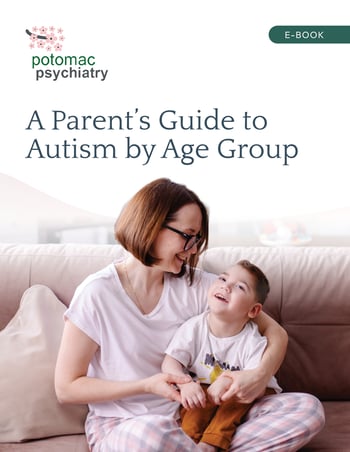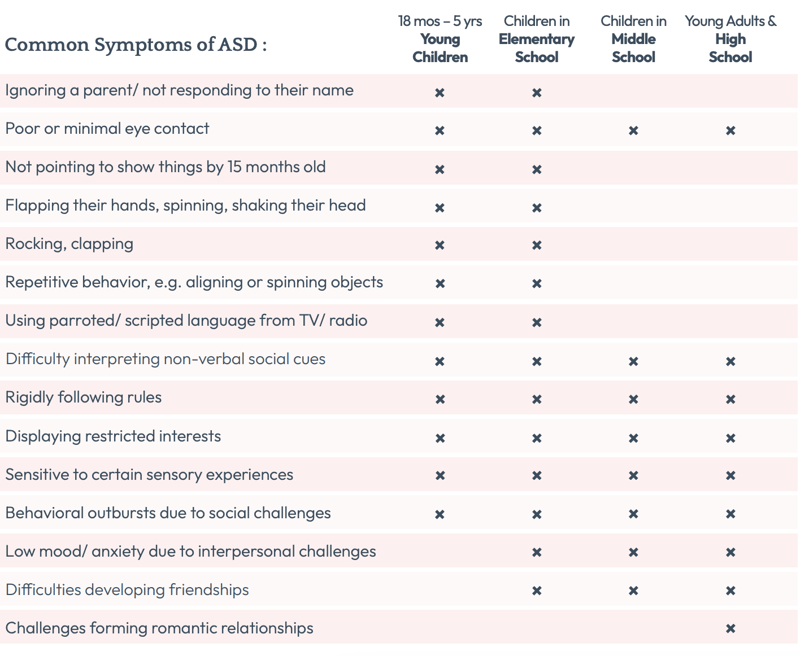A Parent’s Guide to Autism by Age Group
Introduction
Caring for a child with autism can be confusing and overwhelming. Parents of children with autism need the right resources and strategies to provide support throughout each phase of life, from early childhood to the teenage years.
In this guide, we’ll provide resources for autism by age group, covering everything from diagnosis and treatment to ongoing support.

Download a PDF version of this guide by filling out this form, or keep scrolling to learn more.

Defining Autism Spectrum Disorder
Understanding Autism by Age Group
Evaluating for Autism
Supporting Those with Autism
Bottom Line: Optimizing Autism Treatment
Top Experts in Autism - Webinar Series
-1.png?width=2400&height=860&name=Untitled%20design%20(1)-1.png)
Defining Autism Spectrum Disorder
Autism—or, more formally, autism spectrum disorder (ASD)—is a developmental condition caused by differences in the brain that can lead to significant social, communication, and behavioral challenges. Autism is believed to be the result of a complex combination of genetic and environmental factors that include:
-
Prenatal conditions
-
Genetic predispositions or mutations
-
Absence of vitamins or minerals
-
Gut microbiome dysbiosis and leaky gut syndrome
ASD is multifaceted. Each individual can exhibit unique combinations of signs and symptoms.
Behaviors can be triggered by diverse stimuli and influenced by numerous underlying root causes, such as internal and external variables ranging from genetics and autoantibodies to brain tissue, gut health, nutrition status, stress markers, and environmental factors.
Due to the unique qualities of autism, medical professionals prefer the more general term “condition” over the negative connotation of the word “illness.” Individuals with an autism spectrum disorder are not less—they’re different. People with autism experience the world differently, which can manifest as both challenges and strengths.
Resources

Learn about genetic testing & precision medicine for optimizing mental health in autistic children from our experts in neurodevelopmental genetic testing & treatment.
Read More
A recent meta-analysis showed that many patients with ASD have cerebral folate deficiency. This could have significant implications on the future of autism treatment.
Read More
Understanding Autism by Age Group
Because every person with autism exhibits different symptoms and experiences, a diagnosis is especially dependent on age range. Indicators and symptoms of autism develop and change as humans do, meaning ASD will present very differently for a young child and a young adult.
Young Children (18 months-5 years)
Preschool-age children can exhibit signs of autism early on, and screening begins as young as 18 months old. Common symptoms of children with autism under the age of 5 include avoiding eye contact, displaying repetitive or stereotypical behaviors such as lining up toys, ignoring others when called by their name, and/or failing to point. Additionally, limited back-and-forth social interaction in children raises concern for autism.
Early detection of ASD can potentially reduce challenging behaviors, improve socialization, and help restore certain skills that may have been lost. Medical studies have demonstrated that early intervention can lead to optimal outcomes. Treatment will improve a child’s ability to help themselves and socialize. The evaluation process here at Potomac Psychiatry typically involves several steps:
- Developmental screening packet
- Interview by a board-certified developmental-behavioral pediatrician
- A live home video or in-office evaluation
- Autism neurodevelopmental genetic testing to guide modification of gene expression and the Folate Receptor Antibody Test (FRAT) may be recommended if an autism diagnosis is confirmed
- Comprehensive report and treatment recommendations, including financial planning tips
Elementary School Children (5 years-approximately 10 years)
As they enter primary school, elementary school children begin developing their own habits, interests, and personalities. Discovering and understanding their place in the world is a key developmental stage for everyone within this age group.
Failure to meet common age-based expectations may reflect the need for an ASD evaluation. This may manifest itself in the form of limited communication or a lack of age-appropriate social skills. Scripted language, restricted interests, and sensory aversions often present in addition to the above symptoms commonly seen in preschool-age children.
Middle School Children (10 years-approximately 16 years)
After elementary school, social demands tend to increase. Although many children can struggle to maintain these standards, children with ASD might experience severe anxiety and isolation if they cannot meet these increased social demands.
Academic performance, interpersonal functioning, and social communication contribute to the formation of a middle school child’s self-esteem. An ASD diagnosis allows affected children to receive necessary interventions for improving their emotional growth and assist them in developing appropriate social skills. Proper identification of their unique needs can minimize any negative impact on their emotional development.
Teens and Young Adults (16 years+)
At this point in their lives, interpersonal relationships become increasingly complex. Social delays and difficulty with reciprocity can impair the development of lifelong friendships.
As an adolescent approaches the end of puberty, the brain comes a step closer to developmental maturity. At this stage, teenagers learn how to navigate various relationships and interactions by observing and retaining cultural cues, emotional reactions, and etiquette. As the personalities of their peers evolve and mature, teens with autism may not share a comparable developmental progression.
It’s for this reason that early detection of ASD is so crucial to securing proper treatment. Although some aspects of their personality will mirror their peers’ throughout their life, the behavioral differences in undiagnosed or untreated autistic children may become more impairing as they mature.
Resources

To understand the importance of adaptive and personalized evaluation and care, read about Charlie’s autism spectrum disorder diagnosis, co-occurring condition, and resulting treatment.
Read More
Learn what autism spectrum disorder is, how it manifests differently for children across age groups, and what we can do to help at Potomac Psychiatry.
Read More
Evaluating for Autism
Because of autism’s wide range of symptoms, appropriate therapies rely on an elaborate assessment and thoughtful recommendations. This evaluation requires an analysis of the whole person and not just a constellation of symptoms and behaviors.
When evaluating for autism, clinicians analyze personality traits, personal history, and potential comorbid conditions. In selected patients, autism evaluations may also include genetic and folate receptor antibody testing, a gut microbiome assay, and blood studies of nutrient deficiencies and cellular health biomarkers.
Developing a Thoughtful Diagnosis
Although every diagnosis and underlying root-cause contributor differs from person to person, some common symptoms often overlap. Many with ASD may exhibit similar behaviors or triggers, which may include:

The presence or absence of these symptoms doesn’t encompass all the signs of autism or eliminate an ASD diagnosis. The chart above lists some common symptoms that are possible indicators of autism and is to be used only as a reference.
An extensive evaluation and professional assessment of numerous factors is necessary to accurately identify ASD in an individual. This analysis is then used to develop a treatment plan that is uniquely tailored to each individual based upon the specific root-cause contributions to their condition.
Finding Appropriate Treatment
Autism specialists, such as those available at Potomac Psychiatry, combine results from the preliminary evaluation and genetic testing to develop a personalized care plan that’s tailored to each individual.
Some parents may also wish to have their child assessed with folate receptor antibody testing, a gut microbiome assay, or blood studies to identify nutrient deficiencies and cellular health biomarkers. The results of these tests can uncover additional underlying root causes for more effective treatment.
By leveraging years of experience and the latest scientific discoveries in the evaluation and treatment of neurodevelopmental conditions, our experts evaluate and treat ASD in both children and adults as unique individuals. This proven, personalized approach—or what’s known asprecision medicine—ensures top-quality care for each patient and family.

Supporting Those with Autism
Treatment plans, like people, aren’t perfect, and they require adjustments as circumstances change. Providing adequate support for those with autism and their families means deeply understanding their needs, triggers, and characteristics and how they may progress over time.
Helpful Tools
Securing the best mental healthcare is even more challenging without identifying and accessing top-notch medical resources. Implementing one or more of the following proven tactics can contribute to a precise treatment plan for someone with autism spectrum disorder:
-
- Nutritional Psychiatry: Establishing a researched nutrition plan that supports emotional and developmental growth by properly identifying and treating underlying problems in the gut microbiome, immune system, and cellular health
- Medication Management: Finding and prescribing appropriate medication that aligns with the child’s unique genetic makeup and thoughtfully modifying dosages to achieve the best outcome
- Autism Genetic Testing: Uncovering complexities in the child’s genome that may contribute to their mental health status and addressing genetic variations with targeted medications, supplements, and nutrients
- Folate Receptor Antibody Testing: Completing the FRAT test to determine if the child has a recently identified autoimmune condition of the brain. Up to 70 percent of individuals with ASD have an immune system that attacks folate receptors in their brain, detected by this simple blood test. This autoimmune condition can be treated with leucovorin (high-dose folinic acid).
Potomac Psychiatry’s Personalized Methods
In selected patients, Potomac Psychiatry’s specialists will recommend one or more tests to provide treatment guidance, such as:
- Iliad Neuroscience’s Folate Receptor Antibody Test (FRAT)
- Genomind’s PGx Genetic Test
- IntellxxDNA’s Neurodevelopmental Panel
- Genova’s NutrEval or Metabolomix
- Vibrant Wellness’ Gut Zoomer
- KBMO FIT food sensitivities assay
- Assays for other biomarkers
Because neurodevelopmental conditions such as ASD are multifaceted with numerous root-cause contributing factors, advanced laboratory testing is just one component of effective autism care. Our experts also utilize other scientifically validated methods to detect and manage ASD, including:
- Home video observations
- Personal interviews with loved ones
- Evidence-based laboratory tests
- Developmental screenings
All of these key components contribute to our Root Cause Psychiatry approach for treating those with autism and other mental health conditions. This method combines whole-body wellness, personalized treatment, and integrated care to precisely identify and target root causes of the underlying conditions. It allows us to develop and tailor a specific blueprint for helping patients feel better, function more effectively, and provide much-needed relief for family members.

Bottom Line: Optimizing Autism Treatment
Potomac Psychiatry’s aim is to provide emotional support, the latest scientific findings, and comprehensive, structured treatment methods for the children of families struggling to find the best possible resources.
The foundation of our unique approach is that autism has no singular identifier or attribute. Every child with autism falls in a different place on the spectrum. Each child requires a targeted treatment plan centered around their unique environmental factors, personalized genomics, and other laboratory findings.
Our experts’ personalized approach promises autism assessment and treatment that addresses each individual’s unique needs. If you or a loved one may benefit from comprehensive care for ASD, please schedule a no-cost consultation with one of our autism experts. Regardless of age or ability, we provide a precise road map for effective treatment across the life span of anyone with ASD.
Download a PDF version of this guide by filling out the form

.png?width=144&height=144&name=Untitled%20design%20(34).png)






